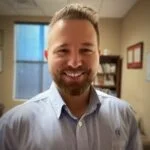It’s easy to get overwhelmed and feel like you’re lost when you’re looking at stepping out into a career in biblical studies.
This masterclass will point you in the right direction.
There’s a lot to biblical studies.

The content of biblical studies is one thing—the manuscripts, texts, traditions, languages, and literature. All of that is why you set out to join this discipline in the first place.
But you keep hearing how bleak prospects are, how hard everything is. And you’re not sure where it all leads.
Higher education in general is facing changes like declining enrollments and increasing contingent faculty appointments. And while your degree is preparing you well in the content of your particular interest in biblical studies, you’re not at all certain how you’re going to navigate the uncertain landscape that lies before you.
The content of biblical studies is one thing. The business of finding your way to and sustaining a thriving career as a biblical scholar increasingly requires a whole additional skill set.
That skill set is definitely something you can learn. The only problem is it’s talked about rarely if ever and cryptically if at all. So, where does that leave you? Do you need to figure it all out from scratch by yourself?

It was the best presentation on the job market, publishing, etc. Thank you for spending the time to invest in others and help us all hone our craft. I found it extremely helpful!
– Joshua Houston, PhD student, Faulkner University
That’s how it was for me.
I wrapped up my PhD in the wake of the “Great Recession.” To say the least, that wasn’t a great time to be looking for what was going to be next.
Others were certainly having similar experiences. But to that point, nothing had really prepared me for understanding and navigating the challenges that lay ahead with starting a forward-moving career.
I’d done well in my academic training to that point. But it then took nearly 3 years of full-time, part-time teaching online and other similar work to begin to understand some fundamental things about what it might mean to break into the field I’d been training to enter.
I then spent another 4–6 years finding and working through resources that would train me how to cope with various demands that weren’t the teaching and research I’d entered this field to do—but that had a remarkable capacity for pulling attention away from those things.
Along the way, I’ve learned that there’s a whole craft to what it means to do biblical scholarship well.
A great deal of that craft applies across specific specialties within biblical studies. But academic curricula tend to focus on those specialties. So, starting to find your way in the discipline can feel a lot like groping around in the dark.
That’s why you need a plan for how you’ll find your way to thriving at the work you love.

Very concise and practical information for any up and coming scholar.
– Gary Staszak, PhD student, University of Wales Trinity Saint David
But you don’t have to go through that.
Of course, I’m still learning, and my own practice is continuing to evolve. But if you’d like to skip over the ad hoc training that took me the better part of a decade, this masterclass condenses the essentials of what I’ve learned so far into a content-packed, 1-hour presentation.
In the presentation, you’ll
- gain the benefit of 10 key lessons about finding your way in biblical studies that many—including me—have had to learn the hard way,
- get a handle on how to develop publishable research,
- find how to craft work-life balance, and
- learn how to see finding your way in biblical studies as a journey of craftsmanship.
To help you get the most out of the material, you’ll also get an exclusive masterclass workbook. And you’ll have 10 additional resources to help you start implementing some of the key practices and principles I discuss.
So, if you’d like to radically accelerate your own “getting your bearings” in this discipline, this masterclass will help you do just that.
If you have questions …
I’d like to try to answer those. So, here are some further details.
Is this masterclass a live event? What do I do if my schedule doesn’t allow me to attend?
This masterclass is a recording of a live session that I did for the European Association of Biblical Studies (EABS). So, you don’t need to worry about whether it will work with your schedule. You’ll get access to the masterclass and all of the accompanying material by email, and you can work through them whenever is convenient for you.
How much is the masterclass?
If you’re a member of the European Association of Biblical Studies (EABS), you get access to this masterclass at no additional charge as a member benefit. Please log into the EABS portal for access instructions.
If you’re not an EABS member, the masterclass is available on a “pay what you want” pricing model for a minimum of $39.
What content from the masterclass already available elsewhere?
If you’re a ThM or PhD student at the Kearley Graduate School of Theology, you’ll get most of what’s in this masterclass when you take BI 7100 Introduction to Post-graduate Biblical Studies.
To help you start working as I describe in the masterclass, it comes with an exclusive workbook. You’ll also get more than half a dozen resources that I’ve previously developed and think you’ll find especially useful.
Why is the masterclass priced like it is?
I offered this masterclass in conjunction with the European Association of Biblical Studies (EABS). EABS members receive access to the masterclass for no additional charge as a member benefit.
Full membership to EABS is €30 per year. Given where exchange rates typically stand, this yearly membership is slightly lower than the minimum price of $39 that you’d pay to purchase the masterclass by itself. So, if you’re eligible to join EABS, the masterclass’s slightly higher minimum price encourages you to join EABS to access the masterclass as a member benefit.
Masterclasses like this one often sell for $79–120 and upward. That’s about two or three times the $39 “pay what you want” minimum. But we also don’t get into biblical studies because it stands out as a monetarily lucrative field.
So, if you’re not eligible for EABS membership, you can get the masterclass on “pay what you want” pricing. This pricing allows you to decide what, if anything, in excess of the $39 minimum you feel good about paying. You’re even welcome to pay the $39 minimum initially, work with the material, and then decide what, if anything, else you might want to contribute, via this tip jar, toward the costs of making this material available.
What if the masterclass doesn’t help me?
No problem. Your purchase is backed by my 100% “wish I’d known this sooner” money back guarantee.
Work with the masterclass material for 30 days. During that time, if you don’t find yourself saying “I wish I’d known this sooner,” reply to the email I sent delivering masterclass materials, and let me know.
If you’re willing to share what you were hoping to find in the material but didn’t, that would be helpful. I’ll take that feedback into account as I work to make this resource even more helpful over time. But either way, I’ll refund your purchase.